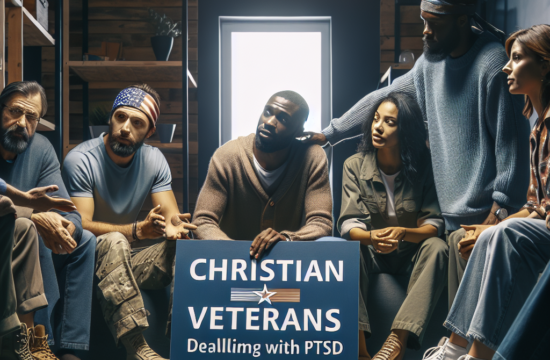Understanding Triggers in Veteran Anger Management
Identifying Personal Triggers
Understanding what triggers your anger is a crucial first step in managing it. For veterans, these triggers may include loud noises, crowded places, or even certain smells that bring back memories from their service. It’s kind of like you’ve got a heightened sense for certain things because of your experiences, and that’s totally valid.
==> Thank you for reading this post! Click Here If you are looking for support and Victory over PTSD.
So how do you identify these triggers? Start by keeping a journal. Write down situations where you felt your temper rising. Note down the time, location, and what was happening around you. Over time, you’ll start to see a pattern.
Another thing that might help is talking to someone you trust. Sometimes, we can’t see our own patterns, but a friend or family member can. Trust me, it’s worth the effort. Once you recognize your triggers, dealing with them becomes a tad easier.
Acknowledging the Emotional Underpinnings
Anger is usually not just about anger. It often masks other emotions like fear, sadness, or frustration. When I was first learning to manage my anger, I realized it wasn’t just about what made me mad. It was also about understanding why it made me mad.
Take some time to sit with your feelings. Ask yourself questions like: “Why did this make me so angry?” or “What am I really feeling right now?” These questions can open up a lot of insight into your emotional world.
Sometimes, it’s hard to get to the root of it on your own. That’s when a professional can be super helpful. They can guide you in exploring these underlying emotions, making the whole process a little less daunting.
Common Triggers Among Veterans
While everyone’s triggers are unique, there are some common ones among veterans. Flashbacks or nightmares, hearing fireworks, and even seeing certain images on TV can be big triggers. These experiences can bring back intense emotions and memories from their time in service.
Being aware of these common triggers can help you understand that you’re not alone in this. Millions of veterans experience similar challenges. Recognizing this can make you feel more connected and less isolated.
Remember, understanding your triggers doesn’t mean you have to avoid them completely. Instead, it equips you with the knowledge to handle them better. It’s like having a roadmap for your emotional landscape.
Techniques for Calming Down
Deep Breathing Exercises
First off, deep breathing is a lifesaver. When you feel your anger bubbling up, stop and take a few slow, deep breaths. Inhale through your nose, hold it for a few seconds, and then exhale through your mouth. It sounds basic, but it works wonders.
This method helps to lower your heart rate and get your mind to a calmer state. You can do it anywhere, anytime. Sometimes, I close my eyes and imagine I’m in a calming place, like the beach or a forest. Visualization paired with deep breathing can amplify the calming effect.
Try to make this a daily practice. The more you do it, the more it becomes second nature. Trust me, it’ll be your go-to move whenever you feel that anger wave coming.
Grounding Techniques
Grounding techniques help to bring your focus back to the present moment. This can be really helpful when your mind is spiraling. One simple grounding method is the 5-4-3-2-1 technique. Acknowledge five things you can see, four things you can touch, three things you can hear, two things you can smell, and one thing you can taste.
This technique helps you divert your mind from what’s making you angry to the here and now. It makes you more aware of your surroundings instead of focusing on the anger-triggering thoughts.
Another grounding method is counting backward from 100. It also helps you zone out of the anger and think about something logical and numerical instead. Over time, these grounding techniques become almost a reflex.
Engaging in Physical Activity
Physical activity is a fantastic way to release pent-up energy and frustration. Go for a run, hit the gym, or take a walk. Sometimes, even a few jumping jacks can do the trick. Physical exertion releases endorphins, which help improve your mood.
Exercise doesn’t just distract you from your anger; it also helps to reduce the overall stress levels in your body. It’s like a double whammy of benefits. Personally, I love going for a jog when I feel the heat rising. It clears my mind and burns off that negative energy.
Don’t forget to find an activity you genuinely enjoy. It doesn’t have to feel like a chore. Whether it’s yoga, hiking, or swimming, the key is to keep your body moving and your mind engaged.
Importance of Support Networks
Family and Friends
Your family and friends are often your first line of support. They know you well and can offer comfort when you need it most. Talking to them about what triggers you and how they can help can make a big difference.
Veterans sometimes feel isolated because their family and friends might not fully understand what they’ve been through. Opening up about your experiences can bridge that gap. Let them in on your journey. They want to be there for you.
Also, don’t be afraid to lean on them. Just having someone to listen can make a world of difference. Sometimes, the best support is simply being heard.
Veteran Support Groups
Connecting with fellow veterans can be incredibly reassuring. They’ve walked in your shoes and understand the challenges you face. Veteran support groups provide a safe space to open up and share experiences.
These groups are not just about venting; they’re also about learning new coping strategies and gaining insights from others. Many veterans find solace in knowing they’re not alone. Plus, you might pick up some tips and tricks that worked for others.
Check out local veteran organizations or online communities. There are a plethora of resources available. Take advantage of them. Sometimes, all you need is to hear someone say, “I get it.”
Professional Help
Don’t underestimate the power of professional help. Therapists, counselors, and psychiatrists can offer invaluable guidance. They provide tools and techniques that are specifically tailored to your needs.
If you’re hesitant about seeing a professional, consider starting with a support group, as many often recommend good professionals. Getting that external perspective can be incredibly beneficial.
Trust me, seeking help is a sign of strength, not weakness. It shows that you’re taking control of your emotional health. In the long run, it can make navigating life’s challenges a bit smoother.
Long-term Strategies for Emotional Health
Developing a Routine
Creating a daily routine can provide a sense of stability and predictability. Having set activities at specific times helps to reduce anxiety and keep your mind focused. It’s like having a roadmap for your day.
Include practices that improve your emotional health, like morning exercises, meditation, or journaling. Think of your routine as your personal toolkit for emotional stability. It’s something you can rely on every day.
Stick to your routine but be flexible when needed. Life happens, and sometimes, you’ll need to adjust. The key is to have a framework that supports your emotional wellbeing.
Continuing Education and Training
Continued learning keeps your mind engaged and opens up new perspectives. It can be particularly beneficial for veterans looking to integrate back into civilian life. Consider taking courses in subjects that interest you or even pursuing a new degree.
Education isn’t just about formal learning. Online courses, workshops, and community classes all count. They provide avenues to meet new people and develop new skills.
More importantly, education gives you a sense of purpose and direction. It’s a reminder that there’s always room to grow and improve, no matter where you are in life.
Finding Healthy Outlets for Emotions
Everyone needs an outlet. For some, it’s painting or writing. For others, it might be playing an instrument or working on cars. Find what works for you. Having a creative or productive outlet can greatly enhance your emotional health.
Expressing yourself through art, music, or any other medium can be incredibly therapeutic. It helps you channel your emotions into something positive and constructive. It’s not about being perfect; it’s about letting your emotions flow.
Remember to set aside time for these activities regularly. They should be a significant part of your routine, helping you maintain emotional balance over the long term.
FAQ
Is it normal for veterans to experience anger issues?
Yes, it’s quite common for veterans to experience anger issues. The transition from military to civilian life can bring up unresolved emotions and stressors, which can manifest as anger.
What can family members do to help a veteran manage their anger?
Family members can offer support by being good listeners, showing empathy, and encouraging the veteran to engage in techniques like deep breathing or physical activities. They can also help by being aware of triggers and creating a supportive home environment.
Are there specific therapies that are effective for veteran anger management?
Yes, therapies like Cognitive Behavioral Therapy (CBT), Eye Movement Desensitization and Reprocessing (EMDR), and group therapy are often effective for veterans dealing with anger issues. Professional therapists can offer these tailored treatments.
Can veteran support groups help with anger management?
Absolutely. Veteran support groups offer a platform to share experiences and coping strategies. Being part of such a community can provide emotional support and practical advice on managing anger.












